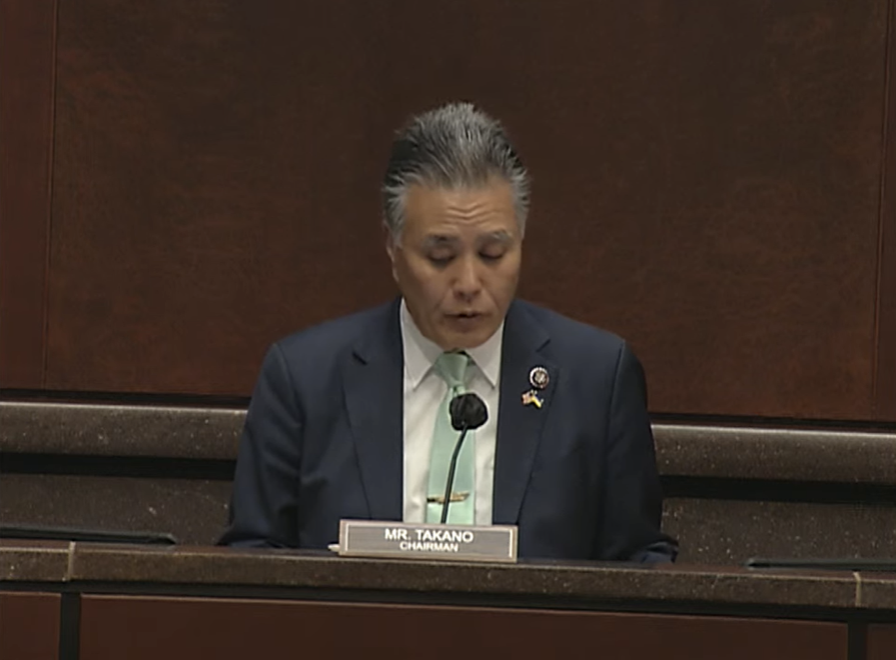Chairman Takano: "It’s clear we need to do more to strengthen VA’s workforce"
WASHINGTON, D.C— Today, House Committee on Veterans’ Affairs Chairman Mark Takano (D-Calif) delivered opening remarks at the Full Committee Oversight Hearing entitled, “Building a Better VA: Addressing Healthcare Workforce Recruitment and Retention Challenges”.

Full video of Chairman Takano’s remarks
Chairman Takano’s remarks as prepared:
Today’s oversight hearing is entitled “Building a Better VA: Addressing Healthcare Workforce Recruitment and Retention Challenges.”
This hearing couldn’t be more timely. This week happens to be “National Healthcare HR Week,” which recognizes human resources professionals in healthcare organizations across the nation for the important role they play across the continuum of care.
Additionally, earlier this week, in accordance with the VA MISSION Act of 2018, VA released recommendations for modernization and realignment of its medical facilities.
These recommendations will be considered over the coming year by the Asset and Infrastructure Review Commission—or “AIR”—Commission.
The Committee is still digesting the thousands of pages of documentation published on Monday, and what this means for the future of VA healthcare in various markets.
I intend to hold a separate hearing on the AIR Commission recommendations. However, one thing is abundantly clear.
VA can improve buildings and build new facilities closer to where veterans live, but if VA does not have the workforce to staff them, it cannot deliver on our promise to veterans. As the Committee evaluates how VA formulated its AIR Commission recommendations, we will carefully examine the extent to which the Department has factored its human capital needs into the equation.
VA’s ability to meet healthcare staffing needs has long been plagued by complex hiring authorities, non-competitive salaries, lengthy onboarding processes, a lack of integration across information technology systems, and other administrative barriers. These challenges have only been compounded by the COVID-19 pandemic over the past 2 years.
Throughout this global public health emergency, VA’s workforce has remained steadfast in its commitment to caring for all those who have served.
VA’s dedicated staff have cared for more than 540 thousand veterans diagnosed with COVID-19. They have administered vaccines to almost 4.5 million individuals.
They have cared for non-veterans by deploying to community nursing homes and other non-VA facilities to support pandemic response. They have done all of this while continuing to deliver world-class healthcare to the more than 6 million veterans who rely on VA for care.
At the same time, the pandemic has led the private sector to offer increasingly attractive salaries, bonuses, and other recruitment incentives, which are making it harder and harder for VA to retain experienced physicians, nurses, and other providers. According to VA, its turnover rate among registered nurses has hit its highest level since 2005. VA is struggling to compete.
I am pleased, therefore, that Representative Underwood’s VA Nurse and Physician Assistant RAISE Act was enacted with the Fiscal Year 2022 Consolidated Appropriations Act last week. But there is so much more work to be done.
In a speech in Charleston, South Carolina, on February 9th, Secretary McDonough outlined 10 priorities for investing in VA’s workforce—its human infrastructure.
VHA recently stood up the “Reducing Employee Burnout and Optimizing Operational Thriving”—or “REBOOT” Task Force, which is examining ways to improve systems and processes that contribute to employee burnout at VA medical facilities.
The Committee applauds both of these initiatives—but it’s clear we need to do more to strengthen VA’s workforce, and the Committee stands ready to help.
I look forward to hearing perspectives from the Department’s witnesses, as well as witnesses from the American Federation of Government Employees and National Nurses United, two labor organizations that represent VA’s frontline healthcare workers.
I hope that today’s hearing will help us all identify some actionable steps to address longstanding human resources challenges at VA. We must work together to ensure VA’s healthcare system will be prepared to care for those who have borne the battle for generations to come.
###
Next Article Previous Article
